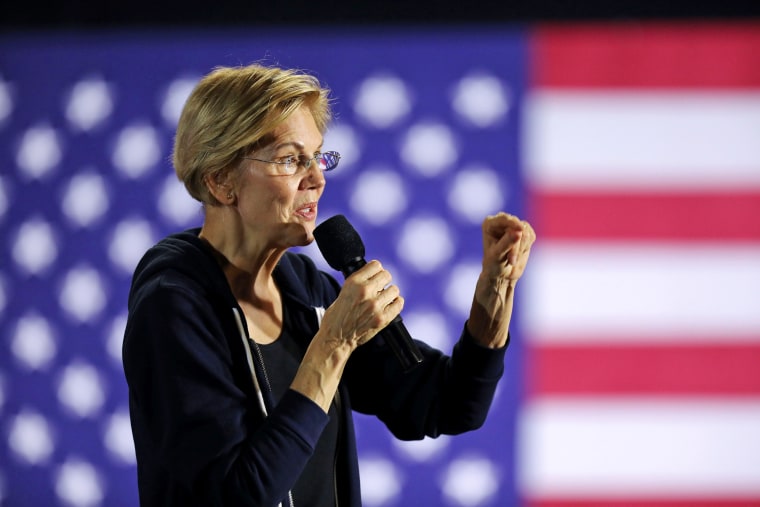Democratic presidential candidate Sen. Elizabeth Warren of Massachusetts released a plan Thursday that would potentially help low-income and other underserved Asian Americans.
Warren announced her “Working Agenda for Asian Americans, Native Hawaiians, and Pacific Islanders,” shared first with NBC Asian America, in which she called for the collection of demographic data on specific ethnicities. Roger Lau, the presidential hopeful’s campaign manager, said the plan would help reveal disparities within the racial group.
“When I was growing up, I heard claims that all Asian Americans and Pacific Islanders fit the 'model minority' mold -- but around me, families were struggling to keep the lights on,” Lau, one of the first Asian American campaign managers for a major American presidential candidate, said. “The Asian American and Pacific Islander community is not a monolith and Elizabeth's Working Agenda shows her commitment to collecting the data and implementing policies that will ensure every AAPI family can build a future.”
Warren said she would establish a task force to work with Asian American communities to obtain disaggregated data across all agencies and departments, as well as key surveys, by the end of her first term. The plan also detailed her position on several other issues including affordable housing, criminal justice reform and fighting white nationalism.
“Data equity is a civil rights issue,” the agenda reads. “And from the wage gap to the 2020 Census, communities that have been perpetually erased are calling to be counted and have their experiences made visible.”
Some federal agencies, but not all, currently collect and publish data on Asian Americans as a whole. The Obama administration had issued a guidance that agencies should collect and publish data that are disaggregated by detailed origin whenever possible. The guidance was largely spurred by the White House Initiative on Asian Americans and Pacific Islanders’ efforts, Karthick Ramakrishnan, founder of AAPI Data, said. The administration made progress with several agencies, including Health and Human Services and the Department of Housing and Urban Development.
“This is the something the Obama administration had started and WHIAAPI worked pretty intensively with various government agencies to move along,” he said.
In contrast, the Trump administration has not made the disaggregation of data a priority, with no significant progress made on the issue, Ramakrishnan added. Warren’s plan would likely be a win for the Asian American community if implemented, he said.
“It would be the first step towards recognition for challenges and problems in particular for [Asian Pacific Islander] communities and then to get public and private investments to address those problems,” Ramakrishnan said. “But you need the data. The data is the important first step.”
Advocates say that by treating the racial group homogeneously, organizations ignore the diversity of experiences of the racial group and further perpetuate the stereotype that Asians are well-educated and financially well-off. Pew Research revealed that the group currently has the largest income gap compared to any other group in the United States with the top 10 percent of the income distribution earning 10.7 times as much as those in the bottom 10 percent.
A 2018 report on Asian American wealth disparity points out that when further examining specific subgroups, those from the Cambodian and Laotian communities, among others, are more economically vulnerable compared to those from the Chinese or Indian communities, for example. And disaggregated data on Asian American and Pacific Islander median household income shows that while Bangladeshi Americans make a median of $46,950, Indian Americans make $95,000.
Legislators in New York state attempted to pass similar policies for years. The bill, sponsored by Assemblymember Yuh-Line Niou, called for the disaggregation of data across state agencies, boards and commissions. Gov. Andrew Cuomo vetoed the bill in December, citing budgetary and implementation concerns.
“Without the accurate measure of data and commitment from the state that the bill would bring, our community will continue to be marginalized and remain invisible,” Niou, D-N.Y., previously said.
Asian Americans are not united behind any single candidate. A 2018 Asian American voter survey showed that 2 in 5 Asian American registered voters did not identify themselves as either Democrat or Republican. While more than 100 prominent Asian American and Pacific Islanders endorsed Warren in January, the Asian American super PAC AAPI Victory Fund came out in support of former Vice President Joe Biden. In California, the state with the group’s largest population, 30 percent of AAPI found Warren favorable. In comparison, 45 percent found Biden favorable and Sen. Bernie Sanders, I-Vt., followed closely behind at 43 percent.
